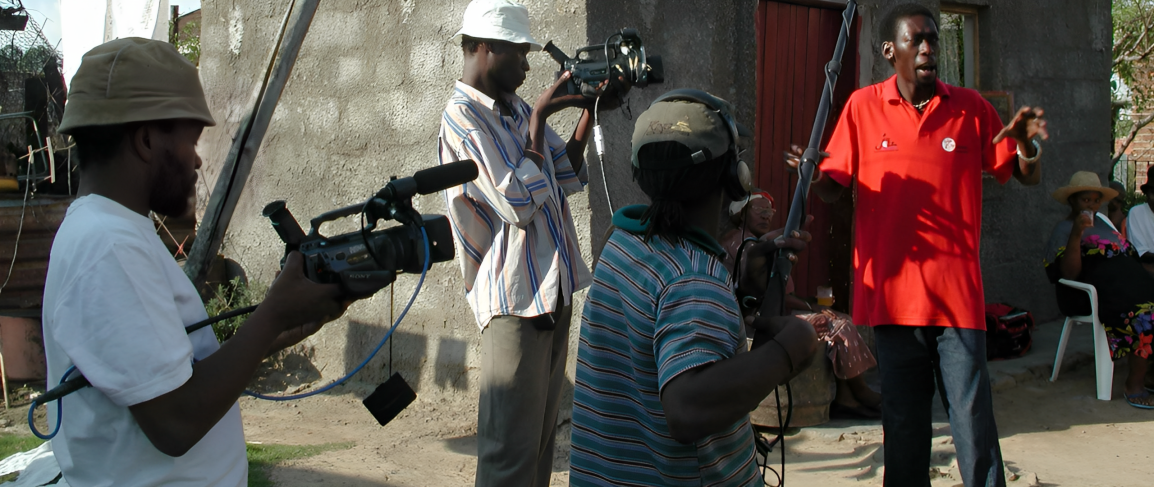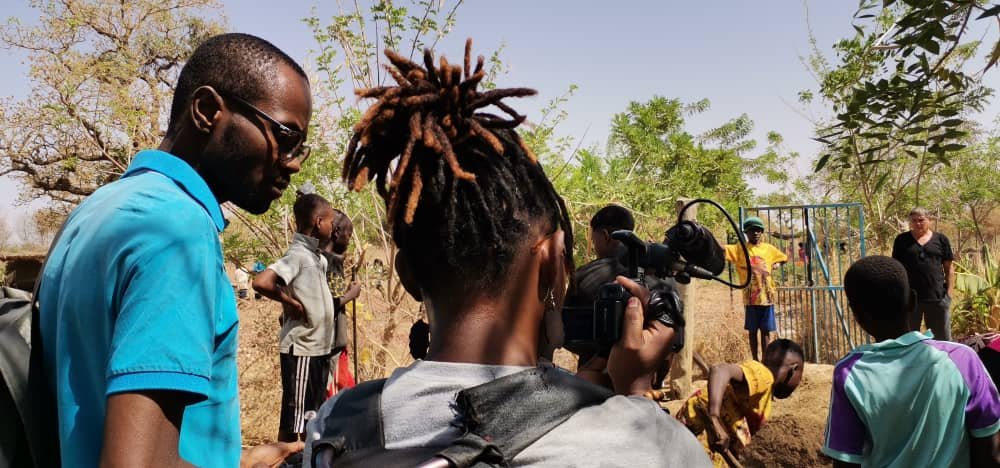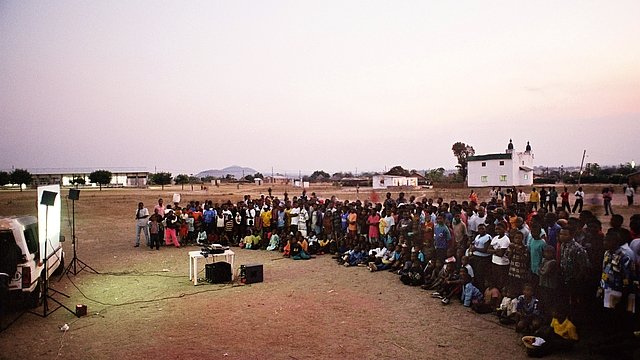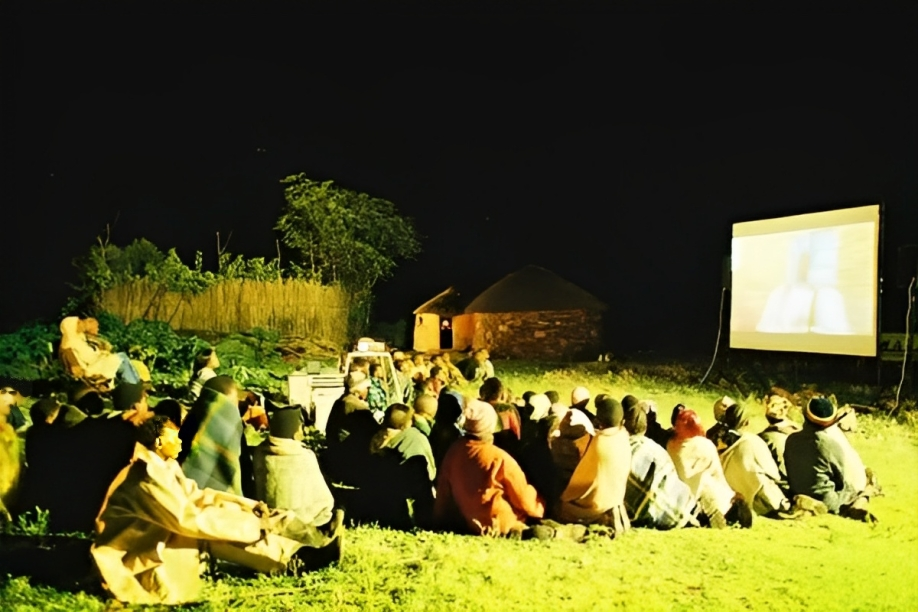Don Edkins on the the Power of Grassroots Storytelling and the Future of African Filmmaking
Written by: Lucia Roggero
Resilient interviewed Don Edkins, an award-winning South African filmmaker and producer, to dive deeper into the landscape of the African filmmaking industry. He shared insights into the historical and cultural context that influence its present reality and the development opportunities that lie in its future. With his work being awarded an Oscar, Peabody, and numerous other accolades, Don is a force in the industry and a true believer in the transformative potential of storytelling - so much so that in 2001 he founded STEPS , a non-profit dedicated to using the power of documentaries to drive change and shift perspectives.
Through projects like “Why Poverty?”, “AfriDocs" and “Generation Africa”, STEPS’ socially relevant documentaries empower and educate audiences, turning conversations about human rights and environmental issues into action. As a seasoned expert at the forefront of African filmmaking and grassroots storytelling, Don shed light on the industry’s pressing needs, the power of grassroots storytelling, the impact of local distribution, and the crucial role of African youth in shaping the continent's future.
Setting the scene: The challenges in the African film industry
When asked about the biggest challenges facing the African film industry, Don honed in on “the lack of pre-production research on film topics; the lack of freedom of expression in a number of Africa countries making the position of documentary filmmakers often politically fragile; the lack of documentary film critics; widespread lack of media literacy” and the “disjunction between the Francophone, Anglophone, Arabophone and Lusophone countries making continental cooperation harder." His answer was based on a research report which he was involved with which looked into the film industry across Africa’s 54 countries. After analysing both the state of the continent’s documentary filmmaking and the interventions needed to support it, the results concluded that the key priorities to grow the African industry were "production funding; training in all aspects of the filmmaking process; audience building; distribution; and policy making.” To unleash the creative potential of Africa, we cannot turn a blind eye to the context in which it exists. The barriers to filmmaking in Africa are a clear indicator of the need for more accessible and collaborative creative industries.
Since the release of the report, the African filmmaking industry has seen progress, noticeable in the creation of initiatives to address the industry’s gaps like the Durban FilmMart Institute, Documentary Africa, Docubox (the East Africa Documentary Fund), the Ouaga Film Lab, and projects such as the Generation Africa film collection.
“In essence, it is still funding, training, distribution, audience building and regional cooperation.”
He explains that if we strive to “help build a sustainable African film industry and in particular bring in a new generation of young filmmakers, especially women,” then these areas still need substantial and consistent support. Especially when we consider that the access to these stories “support our understanding of the world and the roles we can play for addressing inequality at all levels.”
From AfriDocs, a free streaming platform with a catalogue full of African films
Could you imagine a global narrative that disregards or ignores the stories from one of the largest and most populated continents? The African lens adds immense value to the whole global landscape. However, that value can only come by addressing the issues and understanding the roles we all play in bridging the gaps: “The creative industries need wider support from institutions and states but there is generally a lack of understanding of the important role these play in developing societies.”
“Where there is little freedom of expression and desire for social change the power and influence of the creative industries is undermined.”
Storytelling needs to be a vehicle to break away from these restrictive environments and encourage dialogue through diversity. It is not about telling African stories for them but helping set up the infrastructure for them to further develop their creative industries. And by doing so, regaining the power and assurance that they can be the change they want in the world.
The transformative power of grassroots storytelling
This is where grassroots storytelling comes into action. Don defines grassroots storytelling as "empowering multiple voices to be heard, providing opportunities for young people to tell the stories about themselves and their communities." It holds immense power in challenging single-story narratives and amplifying unheard voices. In the case of Africa, in particular, it is crucial to dismantle stereotypes that portray the region solely through the lens of “poverty, hunger, disease and conflict – the stereotypes seen from outside the continent." By embracing diverse perspectives, grassroots storytelling can widen and reshape the narrative, and consequently depict a more authentic reality. In fact, Africa is much more than what is assumed by foreigners. "There are dreams, hopes and resilience from our large youth population", but most importantly, Don emphasises, they "have another narrative to tell."
If we take a look back at the continent’s history, storytelling has always been part of the African DNA. Now, with "the access to new forms of media” Edkins stresses that they have an opportunity to “reach wide and diverse audiences." This is a challenge in a world where access to media production and distribution is limited for the vast majority of the global population. As Don explains, "media is too often controlled by the few, and the few are mostly men, people with access to technology and means, as well as multi-national interests from the global North." This is where grassroots storytelling can shift the industry’s modus operandi.
“To provide the tools and opportunities for individuals and communities to tell their own stories is empowering in itself. There is dignity in this process and promotes respect for each and everyone’s agency.”
At the core of grassroots storytelling lies a very important belief: telling one's own story holds profound significance. Not only does it challenge limited representation or media monopolies prevalent in the creative industries, but it democratises storytelling.
By amplifying the voices that authentically represent the local reality, and decentralising storytelling, grassroots storytelling creates “the spaces and opportunities for new voices that can reach out and connect with each other across the divides, many still in place from colonial times.” It therefore promotes a more nuanced understanding and counters misrepresentations historically propagated from outside.
A new horizon: The future depends on the youth and community building
Increased local participation of storytelling and skills transferring also has immense positive consequences on the ground.
As the driving force behind Generation Africa, a project composed of 25 films sharing the lived realities of African youth through the lens of migration across 16 Anglophone and Francophone countries of Africa, Don is convinced that the future of storytelling can be found in the youth. Not only are they the largest global demographic, but through their actions, they have the chance to redirect the global direction for the generations to come.
“African youth have strengths and powers that can turn the continent into a global player but are not yet being given the opportunity or encouragement to do so.”
“The future of the world is in the hands of the youth,” and the youth in Africa have a major role to play in that. “Africa has the opportunity to show the world how young people on the continent are driving solutions and actions on how to build an equitable, sustainable and decarbonised future." Their response to the pressing challenges, particularly in the context of the climate crisis, can be constructive influence, inspiring change and resilience.
This is a matter which has only become more relevant as the whole world faces a pivotal point in the climate emergency. "With the climate debate now front and centre, the way this generation of young people respond to the questions of our times will hopefully steer the continent away from centuries of extractive economies towards a more sustainable future. This is the same for the global South where collaboration and exchanges can provide a model for a future that is less capitalist driven and extractive." There is no denying that the climate crisis affects us all, but the global South is at the forefront of the effects. Being more closely affected by the environmental degradation and the socioeconomic consequences which this entails, they become an unparalleled source of adaptation and innovation. Grassroots storytelling is therefore not only an empowering experience but also a fundamental stepping stone to drive sustainable climate solutions, both at a local and global scale.
8billion ambassadors and trainees filmmaking workshop
This knowledge sharing aspect of grassroots storytelling is magnified through local distribution and community screenings. As Don explains "creative documentary films that are not didactic have a huge impact when screened to communities, in particular films that are locally made and around local issues.” Storytelling, at its core, has the power and ability to turn ideas tangible and information into conversation. When a story "reaches peoples’ hearts and minds, it makes complex issues more understandable."
Therefore facilitated screenings - spaces where local communities can engage in conversations sparked by a film - allow them to get involved and make the story their own. The audience stops being passive to become active in their own narrative. Don explains that by addressing “global topics such as migration or the climate crisis, (...) from local perspectives with real stories about real people” these topics resonate with the communities at a deeper level, promoting the dialogue and giving people the “opportunity to make their own decisions about what actions to take.”
The future begins now
In conclusion, the African filmmaking industry stands at a critical crossroads, marked by both challenges and opportunities. As Don highlights, there is an urgent need for accessible and collaborative filmmaking to empower African voices and reshape the continent's narrative. Despite contextual barriers, there is a growing movement towards change.
Grassroots storytelling emerges as a powerful tool to challenge stereotypes, amplify unheard voices, and ignite transformative conversations. By embracing diverse perspectives and dismantling historical misrepresentations, African filmmakers can redefine the global narrative, showcasing the dreams, hopes, and resilience of the continent.
Moreover the youth, with their boundless potential and ability to drive change, hold the key to Africa's future. Through grassroots storytelling, they can inspire sustainable solutions and lead the way towards an equitable and decarbonized world. By recognizing the value of African stories, providing support, and fostering collaboration, we can create an inspiring and inclusive global narrative that celebrates the power of storytelling to shape a brighter future for all.









